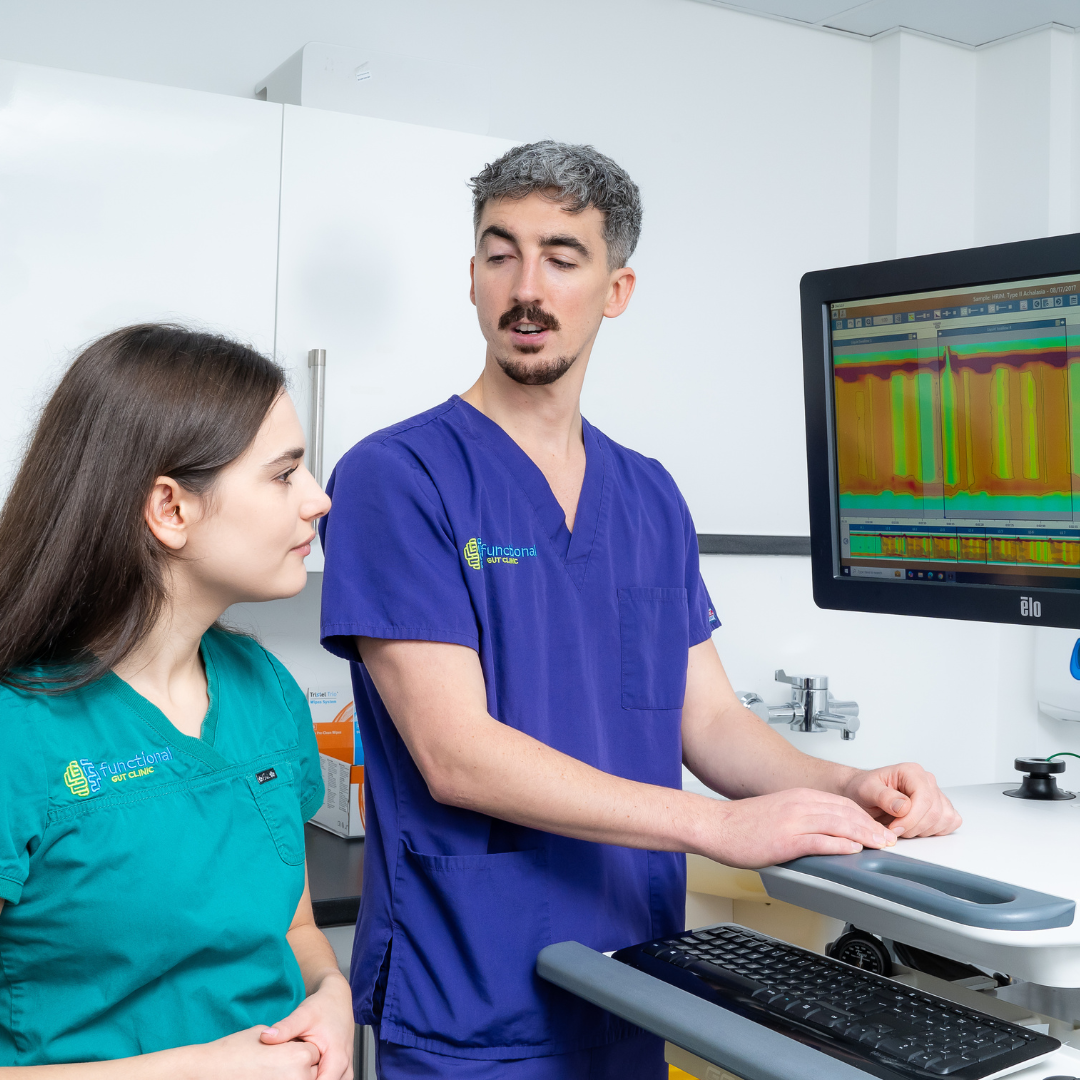Bloating
Struggling with bloating? Here’s what you need to know to find relief.
ALL TEST ARE ACCREDITED & REGULATED BY



What is bloating?
When you’re bloated, your stomach or abdomen can feel full and uncomfortable, or even painful.
This bloating happens when your gastrointestinal tract contains too much gas or air. Bloating can be mild, or more severe, and may present as:
– A visibly distended or swollen abdomen
– Feeling very full and uncomfortable
– Feeling of tightness in the abdomen
– Excess gas – belching and/or flatulence
– Rumbling or gurgling
There are several causes of bloating, so it’s important to diagnose the cause of your bloating and find out why it’s happening to you.

Why does bloating happen?
Prolonged periods of bloating could indicate an underlying health problem, if so you should see your GP.
Possible causes can include:
Irritable bowel syndrome (IBS diagnosis)
Ulcerative colitis, a form of inflammatory bowel disease (IBD), where the inner lining of the large bowel is inflamed and develops ulcers
Crohn’s disease, the other form of IBD, where some parts of your colon are inflamed
Too much bacteria in your small intestine (called small intestinal bacterial overgrowth, or SIBO)
Gastroesophageal reflux disease
Food intolerances, especially lactose or fructose intolerance
Producing too much gas (dysbiosis and fermentation)
Weight gain
Stress or anxiety
Delays in your food and drink moving on from your stomach (called gastroparesis)
Eating too quickly, so that you swallow too much air (called aerophagia)


Diagnosing bloating
Feeling bloated is no fun, but once you know what’s going on you can start to manage your symptoms and the underlying causes.
Testing options:
At the Functional Gut Clinic, we can run the following tests to diagnose the causes of bloating:
Gastric emptying test– which measures how quickly food leaves your stomach
Carbohydrate malabsorption breath test– which finds out if you have certain food intolerances (lactose or fructose)
Small intestinal bacterial overgrowth (SIBO) breath test– which finds out if you have an overgrowth of bacteria in your small intestine (called SIBO)
Oesophageal manometry– which measures the function of your oesophagus (food pipe)
24-hour pH impedance monitoring– which looks at whether you have any reflux
Colonic transit study-a non-invasive test which looks at how long it takes for faeces to pass through your bowl
Learn more about bloating

Heartburn During Pregnancy and How to Deal with It
Heartburn During Pregnancy and How to Deal with It
Expectant mothers often complain of heartburn as their pregnancy progresses. In fact, it affects more than half of pregnant women in their second and third trimesters.
Heartburn, often associated with acid reflux, occurs when acid from the stomach moves backwards into the esophagus, causing irritation and inflammation. In severe cases, the acid can even reach the throat and mouth, leading to symptoms like hoarse voice, bad taste, and tooth decay.
But why does this occur? And what can expectant mothers do about it? Here’s how to deal with heartburn during pregnancy:
Heartburn During Pregnancy
Heartburn is a “burning sensation” behind the breastbone that occurs when stomach acid flows from your stomach into the food pipe (oesophagus). Usually, the condition is mild and is linked to something you eat.
However, in pregnant women – especially during the final stages – heartburn can become severe and persistent. It’s estimated that 30-80% of pregnant women experience heartburn.
Heartburn Symptoms
Unsure if you’re experiencing heartburn? Look for these symptoms:
Burning sensation in the chest or throat
Chest pain
Sour or bitter taste in the mouth
Regurgitation of food or acid
Bloating
Feeling of fullness after eating small amounts
Frequent burping
Worsening of symptoms when lying down or after meals
What Causes Heartburn During Pregnancy?
Heartburn is a typical symptom of gastroesophageal reflux disease (GORD). This condition occurs when the stomach contents repeatedly backflow into the oesophagus over a long period of time.
In pregnant women, the increased risk of GERD is related to their body changes. Three common causes include:
Hormones. Progesterone (the “pregnancy hormone”) is a well-known muscle relaxer. It can relax the lower esophageal sphincter (LES) that usually separates the stomach from the esophagus, allowing for backflow.
Growing Baby. As the baby grows, it increases the pressure in the abdomen. This rising pressure pushes the stomach contents backwards.
Slowed Digestion. Progesterone also slows the movement of food through the digestive system. As a result, the stomach remains fuller for longer, increasing the risk of heartburn.
How to Deal with Heartburn During Pregnancy
Heartburn often becomes more common later in pregnancy. But it’s not inevitable. With a few sensible lifestyle changes and treatments, you can reduce your symptoms.
(Note: It's also important to distinguish heartburn from other conditions that might involve regurgitation, such as rumination, where food is re-chewed and re-swallowed, or sometimes expelled.)
Here’s how:
Change Your Diet
Your diet can significantly increase the risk of heartburn. For example, many people find that spicy, acidic, or high-fat foods trigger their symptoms.
Avoiding these foods might help:
Spicy foods
Fried or fatty foods
Citrus fruits (e.g. oranges, lemons)
Tomatoes and tomato-based sauces
Chocolate
Caffeinated drinks (e.g. coffee, cola)
Carbonated drinks
Peppermint
Onions and garlic
Eat Little and Often
We’re used to eating three main meals per day. However, as the body grows, your stomach can no longer handle that volume as well.
Instead, try eating smaller meals and spread more frequently throughout the day. This allows the stomach to empty quicker and avoid overwhelming it.
Don’t Lie Down Right After Eating
Gravity is your friend. Once you’ve finished eating, stay as upright as possible for the next three hours. This gives your stomach time to empty and relax. It minimizes the risk of backflow from your stomach into your oesophagus.
You should also avoid eating just before bed. Follow the same three-hour window, letting your stomach empty before you lie down for the night.
Prop Up Your Head When You Sleep
If you experience repeated acid reflux during the night, it’s likely because you’re lying flat. Try adding an extra pillow under your head and shoulders (or even raise your bed using blocks). This will let gravity work its magic and prevent acid from flowing backwards.
It’s sensible to raise your head up around 6 to 9 inches, allowing gravity to do the work for you.
Drink After Meals
Drinking with meals increases the risk that your stomach becomes too full.
Instead, try to drink after your meal. This gives your stomach a chance to digest and process the food before filling up its capacity.
Take Medication
If none of the lifestyle and dietary approaches above do the trick, you might want to consider taking a medication to prevent the reflux.
Antacids are the most common way to treat an acid attack. These tablets neutralize the acid in your stomach, preventing heartburn. But you should only take antacids that contain calcium carbonate. Avoid antacids containing sodium bicarbonate as this can increase swelling.
Other medications to treat heartburn aren’t advised during pregnancy and taking them can potentially cause harm to the developing baby.
Ready to Find Relief from Heartburn During Pregnancy?
If morning sickness or that burning chest feeling is making pregnancy less comfortable, don’t suffer in silence. At The Functional Gut Clinic, our friendly specialists offer tailored advice and expert care to help manage heartburn throughout your pregnancy journey.
Find out more about heartburn symptoms and how we can diagnose the underlying cause.
Hear from people we’ve helped, just like you.
"Very professional while welcoming and friendly"
"The manner and demeanour of all staff from reception to people carrying out the test was very professional but welcoming and friendly. Atmosphere is very relaxed and all instructions clear and concise."
London Patient

"Highly recommend this"
"Thanks to Dr Hobson and everyone at the Functional Gut Clinic. The whole team is very kind and generous and they are doing things that are cutting edge and they actually get results."
Manchester Patient

"Highly recommend this"
"After stopping my lansoprazole, every time I had a warm drink, I could feel it burn all the way down to my stomach. Thank you to Sam for making me feel at ease." - Manchester Patient

"My experience could not be better"
"Pleasant and knowledgeable staff that made the experience more enjoyable than it should be!" - London Patient

"Very friendly and knowledgeable"
"An excellent service from beginning to end. I would recommend to anyone who was considering having testing done. Very friendly and knowledgeable!" - Manchester Patient

"Very kind and helpful"
"It was also great to have time to talk to the clinicians – very important when you have problems. Reception staff also very kind and helpful." - Manchester Patient

Are you experiencing any other symptoms
Symptoms are often closely connected. Find out more below.
Reflux

Burning mid-chest, worse when bending or lying down
Constipation

Difficulty going to the toilet, unusual stools, often with stomach ache or intestinal cramps, bloating, nausea or appetite loss
Heartburn

A burning pain in your chest, just behind your breastbone.
The pain is often worse after eating...
Regurgitation

Bringing food or drink back up, difficulty swallowing, feeling that food or drink is stuck in your throat, horrible taste in your mouth
Swallowing Issues

Dysphagia - difficulty swallowing, feeling that food or drink is stuck in your throat, horrible taste in your mouth
Diarrhoea

Loose or explosive stools, can’t get to a toilet in time
Abdominal Pain

Cramps; sharp or dull pain, Bloating, Excessive belching, Nausea or vomiting
Faecal Incontinence

Stools leak unexpectedly, Can’t get to a toilet in time
IBS

Abdominal pain or cramping, bloating, changes in bowel habits and urgency, gas

